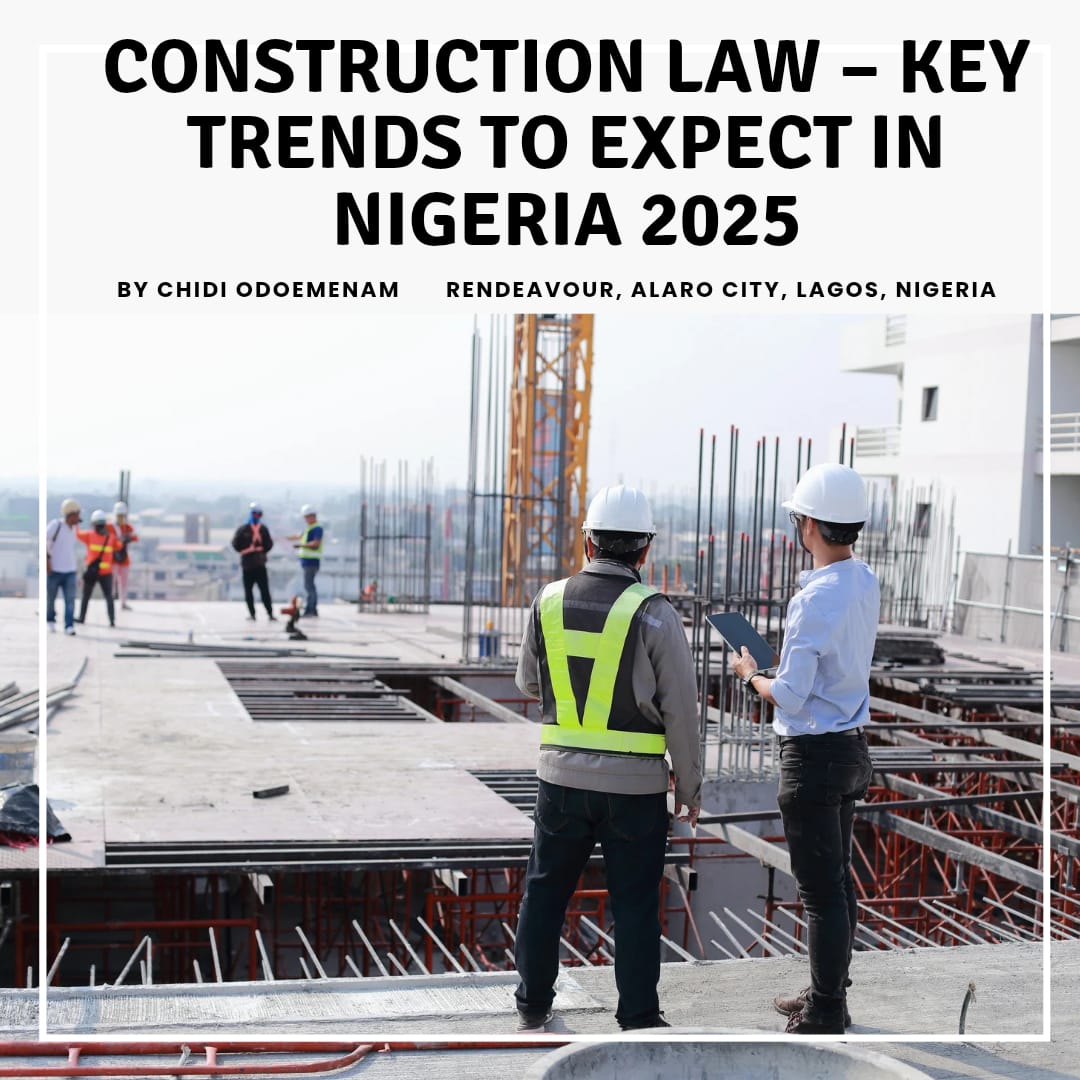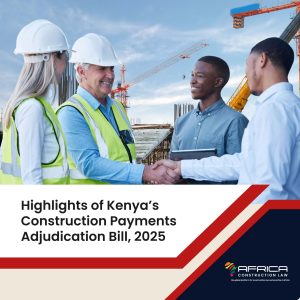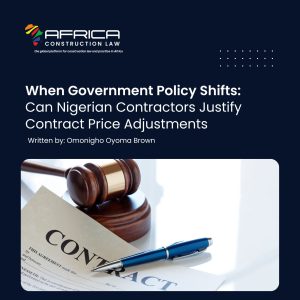By
Chidi Odoemenam (Rendeavour, Alaro city, Lagos Nigeria.)
Construction Contracts and Arbitration, Inflation, Building and Physical Planning Laws, Tax Reforms, Artificial Intelligence (AI)
In 2024, Nigeria’s construction sector faced major challenges due to high inflation, which significantly impacted project costs and timelines. Inflation, driven by factors such as currency depreciation, fuel subsidy removal, and global supply chain issues, led to sharp increases in the prices of materials like cement, steel, and labor. This resulted in many projects going over budget, forcing developers and contractors to request price adjustments. Cash flow issues also arose, with contractors facing delays due to late payment by clients, which further slowed down progress. As a result, projects were delayed, and the sector’s growth forecast was revised down from 2.8% to 1.2%. The inflationary environment also contributed to a rise in Extension of Time (EOT) claims, as contractors cited rising inflation, and supply chain issues as reasons for timeline extensions.
The construction sector also witnessed notable legal developments in 2024. In December, the African Development Bank (AfDB) renewed its 2020 agreement with the Fédération Internationale des Ingénieurs-Conseils (FIDIC) which will now see the multilateral development bank employ ten FIDIC standard contracts for the next five years. The AfDB renewal represents a key endorsement for FIDIC contracts by a major development finance institution and is anticipated to bolster confidence among financial, institutional, and private equity investors in global construction markets. Earlier in April, the Joint Contract Tribunal (JCT) published its long-awaited 2024 suite of contracts, introducing flexible cost adjustment clauses to address inflation and material price fluctuations, revised provisions for handling delays and EOT, and clearer risk allocation between contractors and subcontractors. On the regulatory front, states in Nigeria such as Lagos intensified enforcement of building and physical planning laws with frequent reports of demolitions targeting structures that violates these laws often making the news.
What to expect in 2025
- Inflation will remain a key challenge for the construction sector
In 2025, Nigeria’s construction sector is projected to continue grappling with inflationary pressures, which are expected to significantly impact project costs and timelines. The Nigeria Economic Summit Group (NESG)-Stanbic IBTC Bank Business Confidence Monitor (BCM) report forecasts that Nigeria’s headline inflation rate will average 30.5% year-on-year in 2025, eventually settling at 27.1% by December 2025. This persistent inflation is anticipated to drive up the costs of construction materials, labor, and other essentials, compelling contractors to seek more frequent price variations to be able to complete the projects within budget. Additionally, the Nigerian construction industry is expected to register an average annual growth of 3.1% from 2025 to 2028, supported by investments in sectors such as transport, housing, and energy. However, the high inflation rate is likely to offset some of these growth projections, as increased costs may lead to project delays and financial strain.
Expect stricter enforcement of Building and Physical Planning Laws
States such as Lagos are expected to continue where they left off in 2024 in strict enforcement of building control and physical planning laws. In reaction to multiple building collapses in the state in prior years, most notably the collapse of a 21-story building in the Ikoyi suburb of Lagos in 2023, the Lagos State Government embarked on a strict enforcement drive against unapproved developments and regulatory violations. This culminated in the state government granting a 90-day amnesty period from May to July 2024 for developers and property owners to regularize all permits and ensure compliance with Lagos State building laws. The amnesty period was later extended to 31 December 2024. In 2025, it is expected that with the expiration of the amnesty period, the state government is expected to increase its focus in monitoring and ensuring compliance with building laws. There have also been reports that the Lagos State government is planning to introduce a new building code in 2025 to establish stricter standards for construction, design, and compliance.
- Key changes to Tax Laws to impact the construction sector
Significant changes to Nigeria’s tax landscape, which are part of the reforms proposed by the Presidential Fiscal Policy and Tax Reforms Committee are expected to impact the construction sector. The Deduction of Tax at Source (Withholding) Regulations 2024 which became effective on 1 January 2025, has reduced the withholding tax (WHT) rate for fees paid to resident companies for the construction of roads, bridges, buildings and power plants from 2.5% to 2%, while the equivalent for non-resident companies has been increased from 2.5% to 5%.
The Nigeria Tax Bill which is currently under consideration in the National Assembly proposes a phased increase to the value added tax (VAT) rate, which would increase the VAT rate from 7.5% to 10% in 2025 with the rate increasing to 12.5% in 2026 and up to 15% by 2030. The Bill also seeks to introduce a development levy on assessable profits, starting at 4% in 2025 and gradually reducing to 2% by 2030.
The revised WHT rates will favor local contractors by lowering their tax obligations, while increasing the tax burden on foreign companies, and the planned VAT increase and development levy are likely to drive up construction costs, putting additional pressure on project budgets and financial planning in the sector.
Integration of Artificial Intelligence (AI) into construction to increasingly feature in Construction Contracts and Arbitration
As AI becomes more integrated into the design and construction processes, construction lawyers will need to draft contracts that incorporate AI-specific clauses to properly address this evolving technology. In drafting construction contracts, lawyers will for instance, need to detail the specific AI-powered tools, systems and technologies being employed, such as Building Information Modeling (BIM), drones, aerial imaging software, safety monitoring systems, predictive analytics tools, VR/AR tools and robotics. In allocating liability and risks in contracts, contracts will also need to be drafted to anticipate AI system failure and accordingly allocate liability for delays, defects or damages caused by AI system malfunctions, which may be due to hardware, software or operator errors. This may also require provisions to consider AI system failures as force majeure events, allowing for extensions of time. Provisions relating to how risks associated with AI adoption (e.g., cybersecurity threats or system downtimes) would be shared amongst the parties would also be included in the contracts.
Intellectual property (IP) provisions will also need to account for the growing use of AI in design generation, specifying ownership of designs or outputs produced by AI tools and ensuring clarity over post-completion IP rights. In cases where AI technologies belong to third parties, contracts will include licensing terms and define the scope of their permitted usage. As AI-generated data, such as drone footage or predictive analytics, becomes more common, arbitrators will increasingly recognize and consider such data as admissible evidence in construction arbitration, marking a shift in how disputes are resolved in the sector.


















